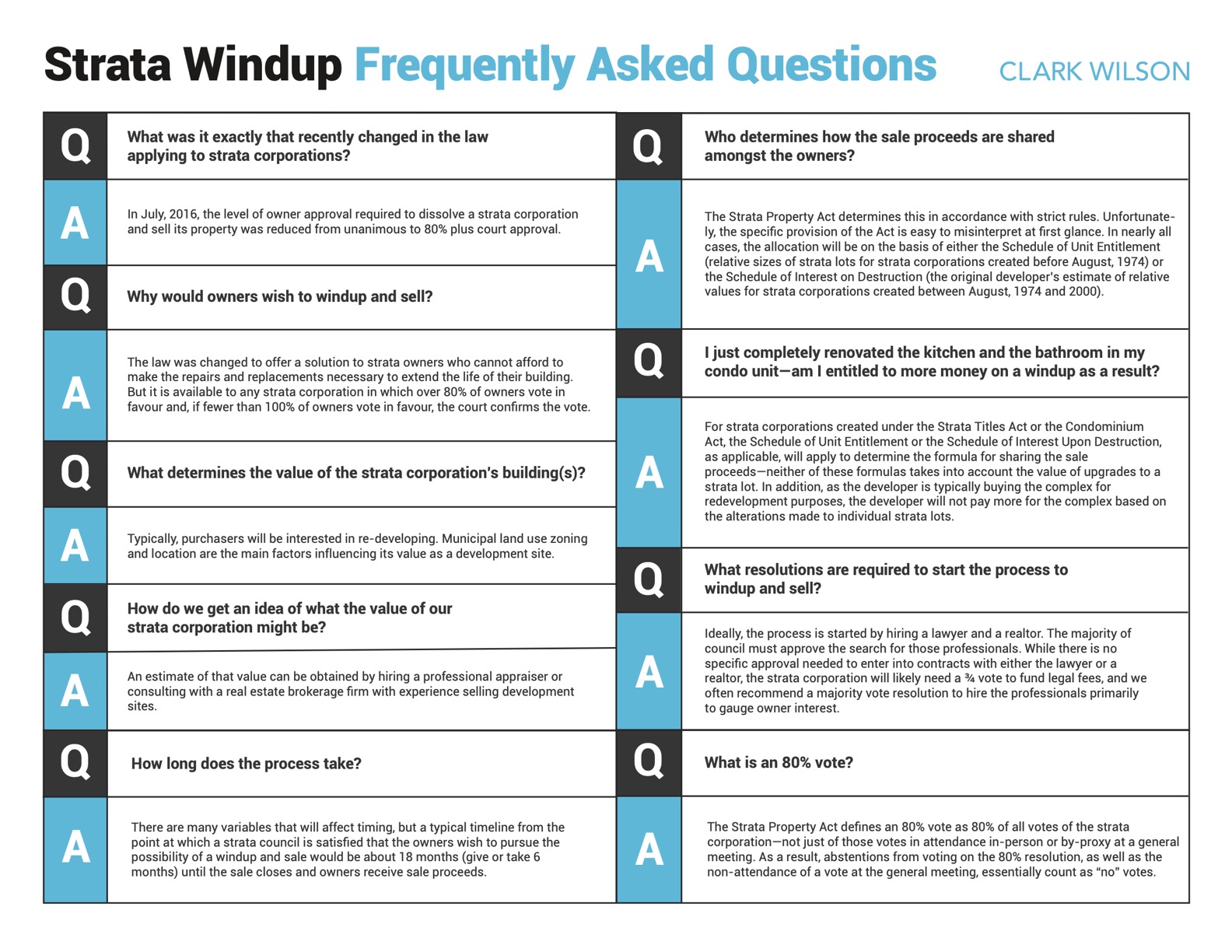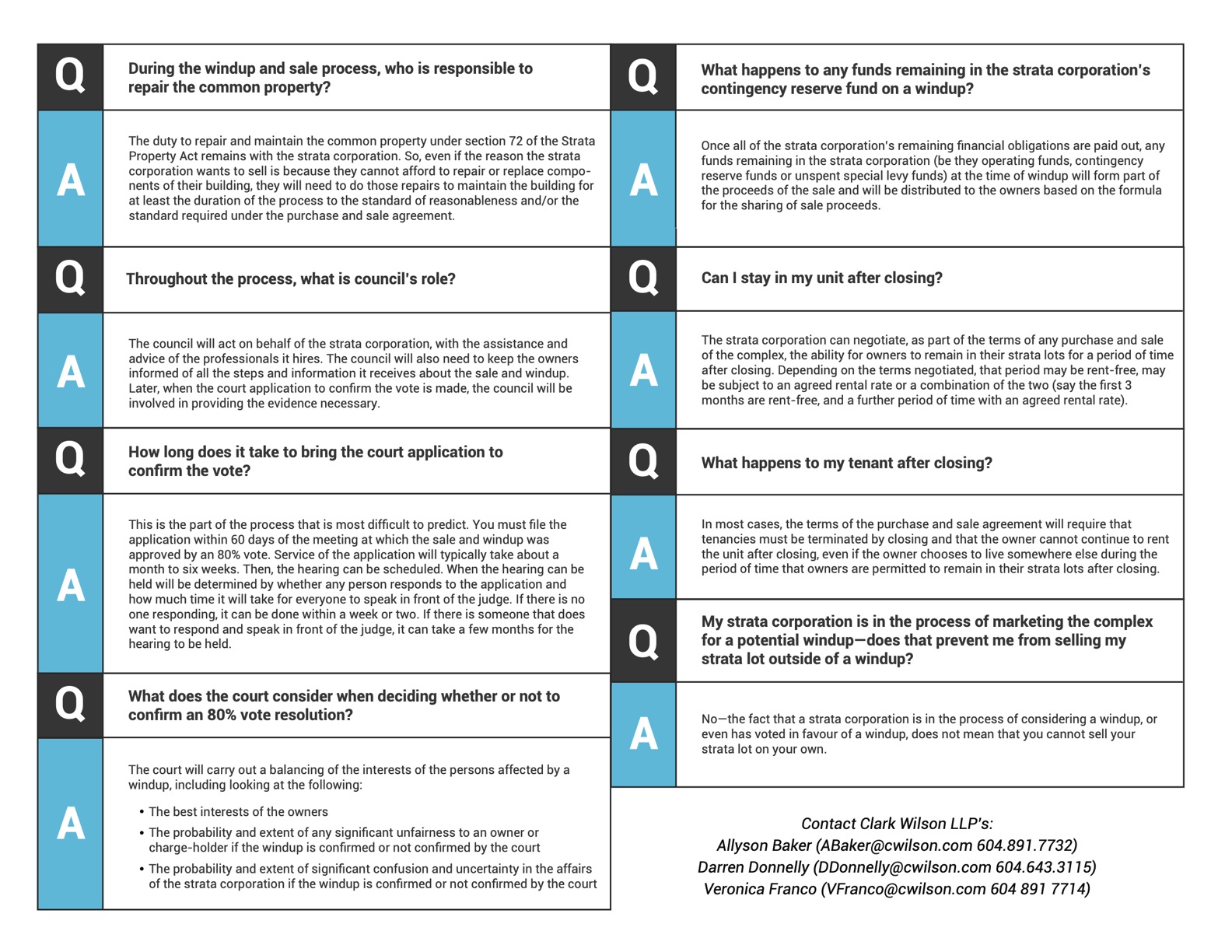As of May 2025, British Columbia's real estate landscape continues to evolve, with strata wind-ups becoming an increasingly relevant topic for property owners, prospective buyers, and real estate professionals. A strata wind-up refers to the voluntary termination of a strata corporation, often initiated to facilitate redevelopment or address significant maintenance challenges. Understanding the rules and processes surrounding strata wind-ups is crucial for all parties involved.
What You Need to Know About Strata Wind-Ups in BC
As property values rise and aging strata buildings become increasingly costly to maintain, more owners across British Columbia are exploring a lesser-known—but powerful—option: strata wind-ups. If you're a condo owner, potential buyer, or investor, understanding this process is critical to making informed real estate decisions.
In this post, I’ll break down what a strata wind-up involves, how it affects both owners and buyers, and what you should consider before proceeding with or purchasing into a building undergoing a wind-up.
What Is a Strata Wind-Up?
A strata wind-up (also known as a termination) is the legal process of dissolving a strata corporation and selling the property as a whole—typically to a developer interested in redeveloping the land.
This is often considered when:
Major repairs are financially unfeasible
The land’s redevelopment potential exceeds its current use
Unit owners collectively see higher returns from a sale than maintaining the status quo
Since legislative changes in 2016, a wind-up no longer requires 100% owner approval—only 80%, plus BC Supreme Court confirmation, is now required.
Key Legal Requirements
Under the Strata Property Act, the process includes:
80% Approval: At least 80% of all registered owners (not just those who vote at the meeting) must approve the wind-up resolution.
Court Confirmation: The BC Supreme Court must confirm the decision—ensuring fairness and protecting minority rights.
Professional Oversight: Legal counsel, real estate professionals, and sometimes a court-appointed liquidator help manage the sale and financial distribution.
How Are Proceeds Distributed?
Many clients ask: Will I get more if I renovated my unit?
Unfortunately, no. Proceeds are generally distributed based on:
Unit entitlement (proportional square footage)
Or, in some older stratas, Interest Upon Destruction schedules
Upgrades (like new kitchens or flooring) do not increase your share of the sale proceeds.
Why Strata Wind-Ups Are on the Rise
More strata corporations are exploring wind-ups for good reason:
Stratas’ nearing end-of-life require major capital repairs
Insurers may limit coverage on deteriorating buildings
Redevelopment offers owners a potentially much higher payout than listing their units individually
This is particularly common in older buildings located in transit-oriented areas or zones with increasing density allowances.
What Owners & Sellers Need to Know
If you're a strata lot owner:
You can still sell your unit privately during a wind-up process
Your unit will remain subject to strata bylaws and obligations until the transaction completes
You'll still be responsible for maintenance and special levies during the process
You may be able to negotiate occupancy after sale, such as rent-free or short-term tenancies post-closing
Also, once the sale is complete, remaining contingency reserve funds or special levies are distributed along with the sale proceeds.
What Buyers Should Consider
If you're considering purchasing in a building undergoing (or at risk of) a wind-up:
Review minutes and AGM/EGM documents carefully
Ask your agent or lawyer if a wind-up resolution has been passed or proposed
Understand that tenancies may not be permitted post-sale
Your financing and occupancy could be affected if the sale is in progress
It’s always advisable to work with a real estate professional experienced in pre-sale and resale markets, as well as redevelopment properties.
FAQs: Strata Wind-Up in BC
Q: What’s the typical timeline?
A: From initial exploration to sale closing, expect 12–18 months.
Q: Who determines the value of the land?
A: Professional appraisers and commercial brokers assess redevelopment value.
Q: Can council start the process without owner approval?
A: Council can initiate exploration, but must consult owners and secure funding via ¾ vote.
Q: What happens to rental units in the building?
A: In most cases, tenancies are ended at closing unless terms are negotiated with the buyer.
Q: What does the court consider before confirming a wind-up?
A: Owner interests, fairness, and potential confusion or hardship if the wind-up is approved or denied.


Additional Resources
For more detailed information on the strata wind-up process, including step-by-step guidance and legal considerations, visit the Government of British Columbia's official page on Termination (Winding Up) a Strata Corporation.
